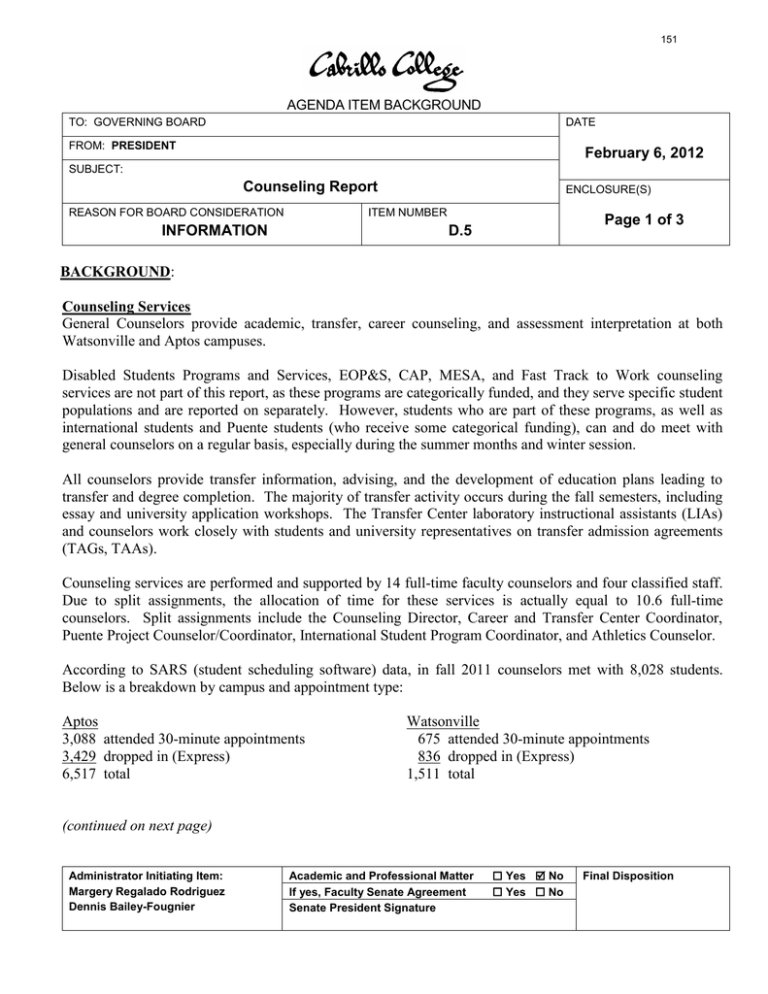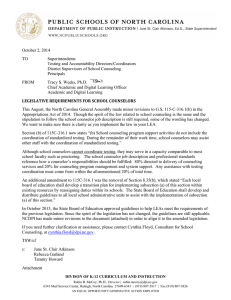: General Counselors provide academic, transfer, ... February 6, 2012
advertisement

151 AGENDA ITEM BACKGROUND TO: GOVERNING BOARD DATE FROM: PRESIDENT February 6, 2012 SUBJECT: Counseling Report REASON FOR BOARD CONSIDERATION ENCLOSURE(S) ITEM NUMBER INFORMATION Page 1 of 3 D.5 BACKGROUND: Counseling Services General Counselors provide academic, transfer, career counseling, and assessment interpretation at both Watsonville and Aptos campuses. Disabled Students Programs and Services, EOP&S, CAP, MESA, and Fast Track to Work counseling services are not part of this report, as these programs are categorically funded, and they serve specific student populations and are reported on separately. However, students who are part of these programs, as well as international students and Puente students (who receive some categorical funding), can and do meet with general counselors on a regular basis, especially during the summer months and winter session. All counselors provide transfer information, advising, and the development of education plans leading to transfer and degree completion. The majority of transfer activity occurs during the fall semesters, including essay and university application workshops. The Transfer Center laboratory instructional assistants (LIAs) and counselors work closely with students and university representatives on transfer admission agreements (TAGs, TAAs). Counseling services are performed and supported by 14 full-time faculty counselors and four classified staff. Due to split assignments, the allocation of time for these services is actually equal to 10.6 full-time counselors. Split assignments include the Counseling Director, Career and Transfer Center Coordinator, Puente Project Counselor/Coordinator, International Student Program Coordinator, and Athletics Counselor. According to SARS (student scheduling software) data, in fall 2011 counselors met with 8,028 students. Below is a breakdown by campus and appointment type: Aptos 3,088 attended 30-minute appointments 3,429 dropped in (Express) 6,517 total Watsonville 675 attended 30-minute appointments 836 dropped in (Express) 1,511 total (continued on next page) Administrator Initiating Item: Margery Regalado Rodriguez Dennis Bailey-Fougnier Academic and Professional Matter If yes, Faculty Senate Agreement Senate President Signature Yes No Yes No Final Disposition 152 From August 2010 through July 2011, counselors met with 17,000 current or prospective students (unduplicated) in over 19,000 visits per year. As of finals week, fall 2011, counseling appointments were booked through January 20, 2012, more than a month in advance. Online Advisor: In addition to in-person 30-minute appointments, daily 10-minute Express counseling, and phone appointments, students continue to have access to counseling services through our Online Advisor service. This highly successful program was the result of an intensive study of best practices throughout the state and was implemented in 2002. When more comprehensive academic planning is needed, a counseling appointment is advised. In the most recent survey of online advisees, the student response was overwhelmingly positive. Half of those using the service are continuing students; the others are either new or returning students. Nearly all indicated that the service made it easier to get started or to re-enter Cabrillo. Reorganization/Structural Changes: Effective July 2011, Instructional Development dean Dr. Margery Regalado Rodriguez moved to Student Services to head up a new division: Counseling and Educational Support Services (C&ESS). Five programs/services joined the Counseling Department in the new division: the Outreach Office, Matriculation Office, Assessment Services, Disabled Students Programs and Services and Learning Skills. The transition has been very smooth. The joint efforts have brought positive changes: An assessment of department needs, greater visibility of counseling services and transfer on campus, advocacy in new arenas, and stronger cross-component collaboration. Being part of a larger division has provided the counselors with a level of administrative support they have not previously had. Specific Program Changes: The Honors Program has expanded into Counseling. Three general counselors now provide counseling to new and continuing honors students, which allows the new Honors/Articulation Director to focus on other critical services. This transition has been smooth and positive for students. Veterans and Foster Youth are additional student populations the counselors are serving in a more focused way. One counselor provides counseling and peer support supervision in the new Veterans Information Center on campus. Another counselor is designated as the Foster Youth Liaison, and we expect this function to evolve with the new Foster Youth Program being developed spring 2012. Student Learning Outcomes (SLO): In Spring 2011, the Student Learning Outcome for Counseling “Create a Plan to Facilitate Educational and Career Goals” was assessed. Students were asked to rate their level of knowledge, both before and after the counseling session of the steps necessary to achieve their academic goals. Questions were based on a 1 to 5 Likert scale with 1 being the lowest and 5 being the highest amount of knowledge. For those students who had very little knowledge (1 and 2) of the steps needed to accomplish their educational and career goals before their counseling appointment, 100% indicated that their knowledge increased after their counseling appointment. Ninety-one (91)% of students with a self-identified level of knowledge of 3 increased to either 4 or 5. Forty (40)% of students with a self-identified level of 4 increased to a level 5. Here are the results: Starting knowledge 1 2 3 4 5 Ending knowledge (exclude no response) 1 3 4 33% 50% 26% 47% 2% 8% 52% 60% 60% 2 5 17% 26% 39% 40% 100% 153 All groups increased their knowledge of the next steps after meeting with a counselor. An additional interesting finding was that 16.3% of the students changed or refined their goals after the counseling appointment. In spring 2012 another measure of this SLO will be assessed as part of the Counseling Program Review, which is scheduled to be completed in June 2012. Counseling and Guidance Courses: During the fall of 2011, all Counseling and Guidance (CG) courses were reviewed for currency and course level Student Learning Outcomes. Some were inactivated, others were updated and ideas for possible new courses are being identified now. Possibilities include a required Student Success course for all incoming students. In 2010, all counselors were asked to teach a course in an attempt to reach more students through a group setting. That is currently being revisited. Most counselors teach at least one class per academic year. New Directions: The timing of the statewide discussions around the Student Success Task Force Recommendations (SSTF) paralleled conversations within the counseling department. The counseling faculty has begun to identify and distinguish services that meet the different needs of students; those with “high engagement” vs. “low engagement” needs. Identifying these different types of student need underlies the knowledge that “one size does not fit all” and that services should be matched to students’ unique needs. This knowledge will better direct students to educational resources (learning communities, student support services, learning disability testing, etc.) This identification will also lead to referrals to specific support services that will increase the students’ chances of success and program completion. Not all students need to see a counselor as their first step; they can do much of the preliminary work online through websites, online orientation, and basic Q & A services. Increasing the use of technology to move students through the processes in a more efficient manner is one of the recommendations of the Student Success Task Force. This results in students seeing a counselor when they are actually “ready” to see a counselor, allowing the service to be more focused on next steps, major and career identification, education planning, and follow up. The expertise of the counselor is utilized in more effective ways and limited counseling resources are used more efficiently. Making an appointment, for example, to see a counselor, and then waiting two weeks only to ask how to log on to Web Advisor is a poor use of time for both the student and the counselor. (The ratio of students to counselors at Cabrillo is currently 1418:1; the statewide Academic Senate recommends 900:1). Additionally, knowing that not all students can or will utilize technology easily requires that we free up time and resources from those who are more “tech savvy” so we can work with those who need more hands-on assistance. The counseling department is also revising processes that will result in a triage system so students can identify which services require the expertise of a counselor and at what point. Some student needs are better served by the LIAs in the Transfer Center, the A&R staff, and online resources, for example. The Counseling Department is exploring the use of additional Web Advisor modules that will permit students to more interactively develop their course plans in preparation for their counseling appointment. The Student Success Task Force recommendations have underscored the importance of matriculation services (orientation, assessment, education planning). As the face of community college changes, the counseling department is ready to make the necessary changes. With the competition for public education growing, helping students focus and persist with the right services at the right time is a benefit for all. 3



